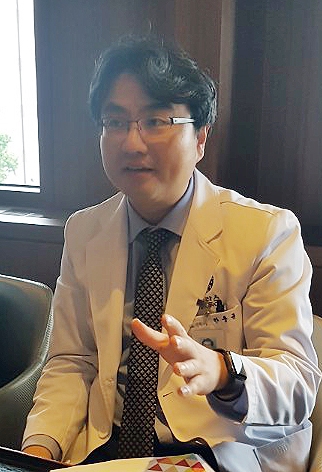Severance Hospital said it has performed 20,000 robotic surgeries, the most in the world, as of Monday.
The announcement came in almost 13 years after the first robotic surgery on July 15, 2005, and four years, seven months and five days after the 10,000th one on Nov. 11, 2013.

“We were able to achieve 20,000 cases of robotic surgeries because we had several robotic surgeries at different departments simultaneously. This shows how much Severance Hospital has advanced for all those years,” said Han Woong-kyu, head of the Robot and MIS (Minimally-Invasive Surgery) Center at Severance Hospital.
At Severance, about 50 doctors use robots in surgical treatments for various cancers such as thyroid cancer, colon cancer, stomach cancer, liver cancer, pancreatic cancer, prostate cancer, kidney cancer, bladder cancer, cervical cancer, endometrial cancer, ovarian cancer, and head and neck cancer. Robots also help remove breast tumors and spinal neuroma.
Robotic surgeries for urological cancer and thyroid cancer accounted for the largest share of the 20,000 robotic surgery cases.
Urological cancer surgeries including those for prostate cancer, considered to be most useful in robotic surgeries, took up 7,100 cases, or 35.5 percent.
Thyroid endocrine surgeries, including surgical removals of thyroid tumors, followed with 6,226 cases or 31.1 percent.
The third most frequent was gastrointestinal surgeries including gastrectomy with 1,897 cases or 9 percent.
The hospital’s Robot and MIS Center succeeded not only in robotic surgeries but academic research after surgery.
The center published more than 350 papers regarding robotic surgeries on medical journals.
The hospital’s excellent education system enabled more than 2,000 physicians around the world to receive robotic surgery training at Severance Hospital.
“Many of them came to us because we have excellent education programs,” Han said.
Severance Hospital also significantly contributed to the advancement of the nation’s robotic surgery industry.
To contain the controversy over the safety of robotic surgery, the hospital conducted a joint study with the National Evidence-based Healthcare Collaborating Agency (NECA).
Severance Hospital is actively seeking collaboration with businesses to develop local robotic surgery equipment, based on its accumulated know-how.
The hospital began a study to assess the safety and clinical effectiveness of Meere Company’s Revo-i, an endoscopic surgical robot developed in academic-industrial cooperation in 2016, in cholecystectomy and prostate resection. The hospital completed the trial in March 2017 with satisfying results.
“The hospital’s Robot and MIS Center played an important role in developing a domestic surgical robot. We have gained a great opportunity to participate in the development of the Korean robot, achieved success in the clinical trial, and the robot finally hit the market,” Han said. “We hold an international academic conference every year. At the upcoming conference in late this year, participants will see us perform a robotic surgery live.”

